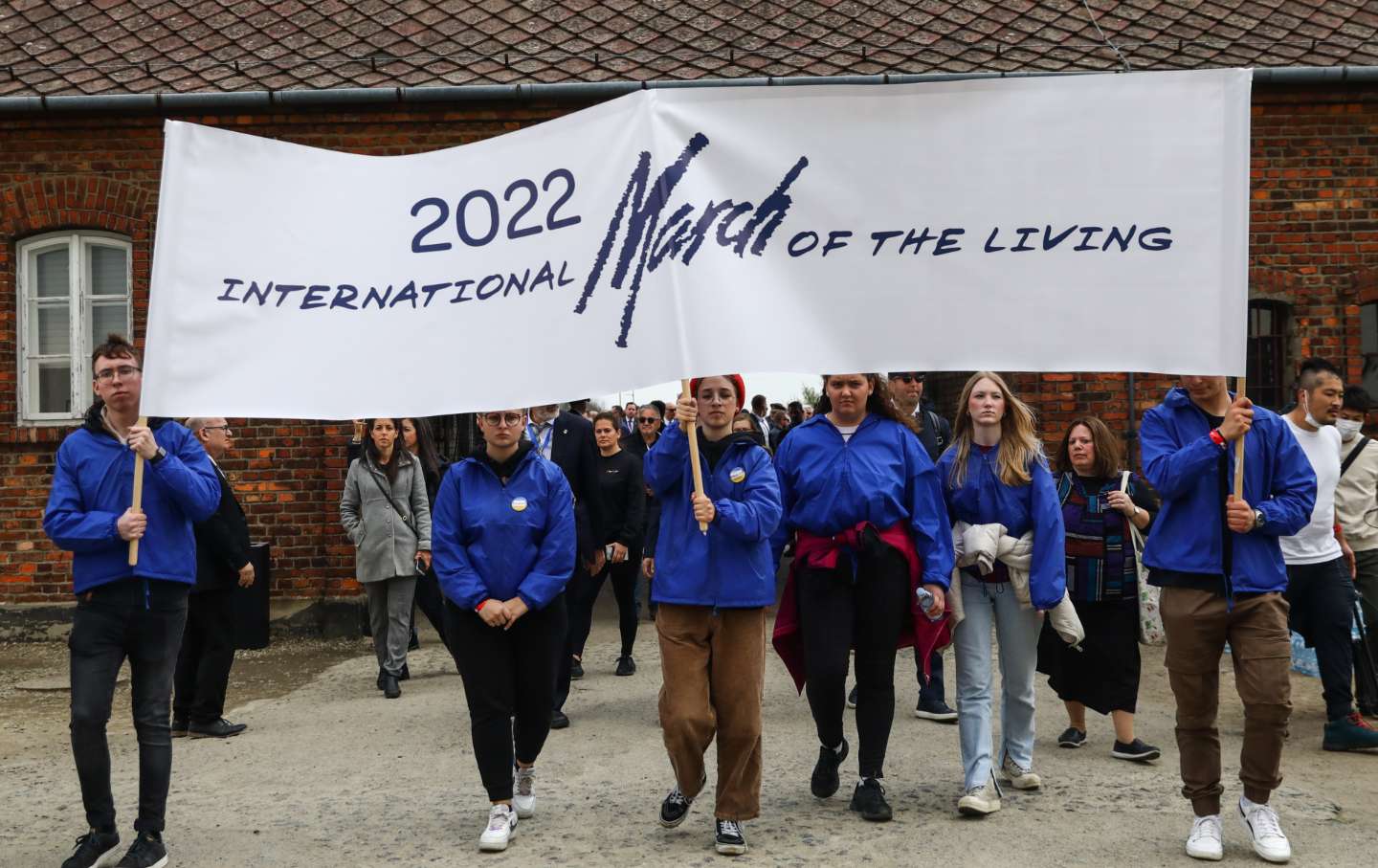
Participants during the March of the Living at the former Nazi-German Auschwitz Birkenau concentration and extermination camp in Poland.(Beata Zawrzel / Getty Images)
Thousands of Jewish youth were originally slated to attend the 2022 International March of the Living in Poland—for many, their first in-person event since the start of the pandemic. The annual event, which took place this year in late April, brings together Jewish youth from around the world to visit the sites of former concentration camps, attend educational events, and explore the remnants of Jewish society in Poland.
This story was produced for StudentNation, a program of the Nation Fund for Independent Journalism, which is dedicated to highlighting the best of student journalism. For more Student Nation, check out our archive or learn more about the program here. StudentNation is made possible through generous funding from The Puffin Foundation. If you’re a student and you have an article idea, please send pitches and questions to pitches@thenationfund.org.
Every year, participants walk the 1.6 mile stretch from Auschwitz I to Auschwitz-Birkenau to commemorate the “death marches” Jews were forced to perform when they were transferred from one camp to the other. Many former participants describe the event as transformative. “It was really just mind-blowing. And really put things into perspective,” said Aly Rosenzweig, who attended the March in 2018 on its 30th anniversary.
But this year, the war in Ukraine disrupted those plans. Almost all North American delegations pulled out, though a few hundred Americans decided to take the risk. A handful of European countries sent shrunken delegations.
In the words of the March of the Living organization, this year’s march happened “in the shadow of war,” with only 2,500 or so young people participating where there usually are over 10,000—and only eight Holocaust survivors attending.
Though this year’s march was smaller, the president of International March of the Living, Phyllis Greenberg Heideman, considered it an important example of how the organization adapts and grows with the times. Some groups that went to Poland participated for the very first time, such as the delegation of Ukrainian refugees, Jewish individuals among the 3 million refugees who have poured into Poland since Russia invaded Ukraine in February.
For the very first time in the march’s history, there was also a delegation from the United Arab Emirates, where a chapter of March of the Living was recently established. “For us, that’s extraordinarily exciting,” said Heideman. “There is a want and a need for Holocaust education, for understanding the past. What does it mean? The word Holocaust doesn’t have the same meaning to peoples around the world and they don’t understand what it is we’re talking about.”
The march’s mission is to reinforce the idea of “never again” by educating young people against intolerance and hatred, and prevent future atrocities from happening around the globe. Yet under the current circumstances, some say these promises ring hollow. “Never means never, and… I don’t know how I feel about that right now. Because never means never is kind of happening all over the world,” said Sharlene Wilder, a former chaperone of the Toronto chapter of March of the Living.
Wilder’s sentiment resonated at the 2022 march, where most speakers, from the president of the International March of the Living to Holocaust survivor Edward Mosberg referred to the ongoing humanitarian crisis in Ukraine in some way, explicitly linking past atrocities to the present. Polish President Andrzej Duda, a controversial figure not only for his Eurosceptic and anti-LGBTQ+ views but also his Holocaust revisionism absolving Poland from its responsibility in Nazi Germany’s crimes, also spoke out strongly against Russian aggression in Ukraine. “Russian leaders spoke many times here, they expressed their pride that the Red Army liberated Auschwitz-Birkenau concentration camp, and after all that, they drop bombs on Babi Yar, the place of torment of thousands of Ukrainian Jews. How is that possible at all?” he said.
The theme of this year’s march was passing the responsibility for remembrance to the next generation. “The most memorable moment was the testimony at the ceremony of the Holocaust survivor. I think it’s the closest you can get to feel what it really was like,” said Benjamin Chacham, a marcher from the Belgian delegation. Those who missed out on this year’s event because of the war, he said, should attend in the future. “Every person in the world should go there [Auschwitz] once,” said Chacham. “We lost two years to Covid, and now three years of the trip. But people should not give up, they should still do it.”
Charlotte RubinCharlotte Rubin is a Belgian writer and graduate student at New York University’s Arthur L. Carter Institute of Journalism. She writes about identity, migration, language, law, culture, and the intersections between all of the above.